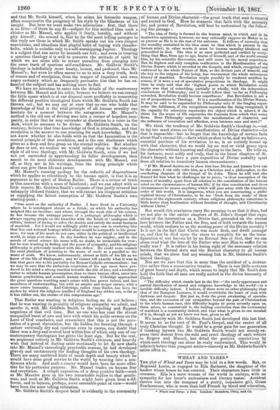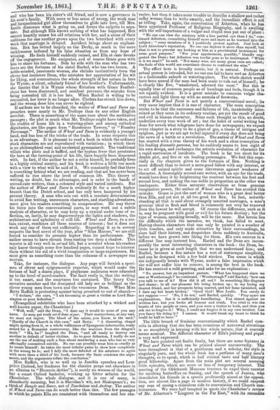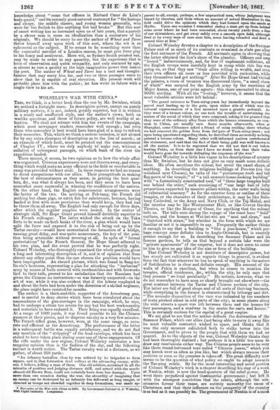WHEAT AND TARES.* Ms plot of )Pleat and Tares may
be told in a few words. Rex, or Reginald Leslie, is engaged to Ella Bathurst, the daughter of the banker whose house he has entered. Their characters have little in common. Ella is a mere woman of the world in embryo, with no sympathy for her lover's enthusiasm and literary tastes. Accident throws him into the company of a pretty, impulsive girl, Grace Featherstone, who is more than half French by blood and education,
• Meat and Tares: a Tale. London: Saunders, Otiey, and Co. and who has been his sister's old. friend,- and is now a governess in his aunt's family. With more or less sense of wrong, the weak man and inexperienced girl allow themselves to glide into love, till Mrs. Leslie discovers what is going on, and forces the culprits to sepa- rate. But although Ella knows nothing of what has happened, Rex cannot heartily renew his old relations with her, and a sense of their unfitness for one another grows upon the two betrothed with every week that marriage is delayed. Accident brings about an explana- tion. Rex has betted largely on the Derby, as much in the mere recklessness induced by his false situation as from any hope of winning. He finds himself suddenly ruined, and Ella at once breaks off the engagement. He emigrates, and of course Grace goes with him to share his fortunes. Side by side with the man who has two loves are the fortunes of his sister Rachel, who has two lovers. A noble-minded, passionate woman, she shrinks instinctively from the clever but insincere Dean, who mistakes her appreciation of his wit for liking, and concentrates the whole strength of her nature in love for Wynne, a silent, scholarly friend of her brother's. Unfortunately, she fancies that it is Wynne whose flirtation with Grace Feather. stone has been discovered, and accident prevents the mistake from being corrected till it is too late. When Rachel is willing to be reconciled, her lover is no longer alive. Cholera has struck him down, and the wrong done him can never be righted. If authors are to be classified, the writer of Wheat and Tares ap- proaches more nearly to Mr. Trollope than to any other English novelist. There is something of the same tone about the meditative passages ; the plot is much what Mr. Trollope might have taken, and the studies of home life in a watering-place and among cathedral dignitaries, are like pages from " Barchester Towers," or " Framley Parsonage." The author of Wheat and Tares is evidently a younger hand, and has less of the tricks of the trade. In some respects this is an advantage. It is pleasant to read a book in which the ordinary stock characters are not reproduced with variations ; in which there is no philosophical roue, and no clerical gymnasiarch. The traditional villain who plots and is h. lied, and the typhus fever that prostrates the hero at the turning-point of his life, have happily been dispensed with. In fact, if the author be not a critic himself, he probably lives in a highly critical society, and his book is written a little too much with a view to what will be said of it. We constantly feel that there is something behind what we are reading, and that art has never been suffered to rise above the level of common life. This theory of writing, no doubt, has its advantages, and is safer in the hands of second-rate writers, than a coloured style and varied incidents. But the author of Wheat and Tares is evidently fit for a much higher branch' than the Dutch school, and has only been hampered by his present theory. A man who sets out with a resolute determination to avoid fine writing, uncommon characters, and startling adventures, must give his readers something in compensation. He may throw his force into the conversational parts, or may work out a subtle analysis of character, or he may keep up a cynical under tone of re- flection, or, lastly, he may daguerreotype the lights and shadows, the architecture and upholstery of still life. Wheat and Tares, to a cer- tain extent, combines all these sources of interest ; but it does not work any one of them out sufficiently. Regarding it as in several respects the best novel of the year, after " Silas Marner," we are still forced to consider its promise higher than its performance. The author seems to have shrank from casting too deep a shadow. This reserve is all very well in actual life, but a novelist whom his readers only know through some few hundred pages, cannot hope to interest them without the aid of a vivid imagination or large experiences. He must give us something more than the columns of a newspaper can contain.
Take, for instance, the dialogue. Any page will furnish a speci- men of clever and epigrammatic repartee, which would make the fortune of half a dozen plays, if playhouse audiences were educated up to the level of novel-readers. The fault really is, that the writing is too smart, and the smartness too sustained. The heavy Con- servative member and the dissipated old lady are as brilliant as the clever young men from town and the venomous Dean. When Miss Betty Raffish is protesting against being preached to out of church- " I declare," she says, " I am becoming as great a victim as Lord Buz- xington or poor Atherton." (Evangelical celebrities who have been attacked by a wicked and well-known paper, the Chanticleer.) "Well, well," said the Dean, "I dare say it would do none of you any harm. Le sang qui code est-ii done sipur. Their martyrdoms, at any rate. we mug not regret. The blood of the saints, you know, is the seed." "Hardly of the Church in this case," said Betty. " A dissenting chapel might spring from it, or a whole wilderness of Spurgeonic tabernacles, ready armed for a Romanist controversy, like the warriors from the dragon's teeth." " Ha, ha !" laughed the Dean, " and all ready to destroy one another in default of better victims. As to poor Atherton, I really do not see the use of making such a fuss about murdering a man who has so very effectually committed suicide. No one can possibly treat him so cruelly as he treats himself: he takes the most infinite pains to show how completely in the wrong he is; and I defy the most deluded of his admirers to agree with more than a third of his book, because the facts condemn the argu- ments, and the arguments refute the conclusion." Miss Raffish, who is so well up in Jacobin speeches and Lem- pnere (indeed, her fondness for the classics peeps out elsewhere in an allusion to "Homeric deities"), is surely no woman of the world, but a smart Oxford bachelor, working up bitter articles for the Chanticleer. The whole dialogue, and it is one of many, is abundantly amusing, but it is Sheridan's wit, not Shakspeare's • we think of _Dangle and Sneer, not of Touchstone and Audrey. The author of Wheat and Tares can do much better than this. The few passages in which he paints Ella are consistent with themselves and her cha-
ranter, but then it takes more trouble to describe a shallow and rather sulky woman than to write smartly, and the immediate effect is not as telling. Take, again, the conversation of Atherton, when he has been appointed Professor of Religious Biography, and is swelling with the self-importance of a vulgar and stupid man put out of place :
" No one can view the ministry with a less partial eye than I do," con- tinued Atherton, committing himself more and more as he warmed into the subject ; "some members of it I positively protest against. Just look at Lord Atrocious's reputation. No one can deplore it more than myself, but that is not to prevent my looking at him as a providential instrument for some good purpose." "For your appointment, possibly," blandly sug- gested the Dean; but Atherton was too far gone to be interrupted. " What is it we read ?" he said. "Not many wise, not many great ones are called; the fools of this world are sometimes chosen to confound the wise."
The effect here is broadly comic, but it is natural. Perhaps no actual person is intended, but no one can fail to have met an Atherton in a fashionable suburb or watering-place. The whole sketch would have been unreal if the man had been made to talk out of himself ; he is clearly like Eve, "unadorned, adorned the most." But this is equally true of common people as of humbugs and fools, though it is not equally evident. It is a great mistake to canonize vulgar cha- racters and light them up with an aureola of fireworks.
But Wheat and Tares is not merely a conversational novel ; its very name implies that it is one of character. The main conception seems to be that the successes and failures of life, inextricably inter- mixed as they seem in its ordinary routine, are yet the result of good and evil in human character. Some such thought as this, no doubt, underlies every true work of art ; but the habit of serial writing has done for novels what telegrams have done for newspapers; we expect every chapter in a story to be a glare of gas, a tissue of intrigue and epigram, just as we are apt to feel injured if every day does not bring the news of a battle or a revolution. The author of Wheat and Tare has started with a true theory of his work and a clear conception of his leading dramatis persona, but he suddenly seems to lose sight of his own design,. and exchanges the artistic evolution of character for a rapid succession of incidents. The book is far too short for its double plot, and five or six leading personages. We feel this espe- cially in the chapters given to the fortunes of Rex. Nothing is more difficult than to invest a mere good fellow with any interest, or to set off animal spirits and some cleverness against weakness of character. A thoroughly second-rate writer, with an eye for the trade, would have done it by heightening the contrast between his first and second love, and making the one noble in proportion as the other was inadequate. Either from accurate observation or from genuine imaginative power, the author of Wheat and Tares has avoided this mistake. Grace is just the sort of woman who is a great deal better than Ella, and yet not at all too good for Rex. In fact, notwith- standing all that is said about strangely assorted marriages, a man's genuine ideal in flesh and blood is commonly not very far removed from the lowest he will accept. Of course the difference, such as it is, may be pregnant with good or evil for his future destiny ; but the type of woman, speaking broadly, will be the same. But herein lies the difficulty which the narrator, we think, has failed to meet. Having chosen characters that can only be painted in a number of little touches, and only made attractive by their surroundings, he slurs half their history, and despatches them suddenly to Australia, before we have grown into liking for them. His own success in a different line may instruct him. Rachel and the Dean are incom- parably the most interesting characters in the book : the Dean, be- cause he is given at such length that we can understand him; and Rachel, because a fine nature has a sort of statuesque simplicity, and can be designed with a few bold strokes. The scene in which she indignantly breaks with Wynne, under a false impression which she wilt not suffer him to remove, is among the best in the book. He has received a cold greeting, and asks for an explanation : "No answer, but an impatient gesture. ' What has happened since we met at Westborough?' he continued. Westborough P said Rachel; ' how can you talk to me of it? How did it all end ? In something like disgrace and shame ; in all our pleasant life being broken up ; in my losing my dearest friend, and her prospects being marred, and her fame tarnished, and I dare say her heart broken.' Good God ! Miss Leslie. You surely do not suppose —"No, I do not,' said Rachel, quickly. Pray spare me explanations. But it is sufficiently humiliating. You sinned against no written law, but you broke all honour and truth. You tried to win the hearts of two people at once, and you were a traitor to both, and then you ask me to forgive it! Why, I could not forgive it in my own brother. Can you fancy his doing it ? I cannot. It would break my heart to think he could be half so base.'" The little breach of feminine conventionality which Rachel com- mits in allowing that she has been conscious of unavowed attentions is so completely in keeping with her whole nature, that it scarcely seems unusnaL The different character of Ella's jealousy and pique is very well expressed. We have pointed out faults freely, but there are some features in Wheat and Tara which can be praiied almost unreservedly. The tone throughout is that of a gentleman and a scholar, the style is singularly pure, and the whole book has a perfume of many men's thoughts, so to speak, which is half critical taste and half literary good fellowship. Apart from the main plot are several amusing little episodes, which are more or less of temporary interest. The meeting of the Oldchurch Museum trustees to expel their curator for catching butterflies on Sunday, and the speech of Junius, who demolishes his friends in a speech professedly aimed at the opposi- tion, are almost like a page in modern history, if we could suspect any man of seeing a ridiculous side to convocation and Church con- troversies. We were half tempted to quote the Chanticleer's review of Mr. Atherton's " Lingerer in the Far East," with its recondite knowledge about " some fast officers in Richard Coeur de Lion's body-onard," and its serenely good-natured contempt for " the bishops and Clergy, the middle classes, and young women generally, who were far too foolish to like anything but bad books." But this sort of smart writing has so increased upon us of late years, that a parody by a clever man is more an idealization than a caricature of his originals. We should be sorry to see the author of Wheat and Tares throw himself away upon work of this sort, where the wit is as ephemeral as the subject. If he means to be something more than the successful novelist of a London season, he must give freer play to his fancy and sentiment. Mere wit, as Sydney Smith pointed out, may be made to order in any quantity, but the experience that is born of observation and quick sympathy, and only matured by age, is almost as rare a quality as the high imaginative power that makes the poet. The author of Wheat and Tares has a tact and thought- fulness that may carry him far, and two or three passages seem to show that he is capable of real elevation. His present work will probably place him with the public; let him write in future with a single view to his art.
































 Previous page
Previous page